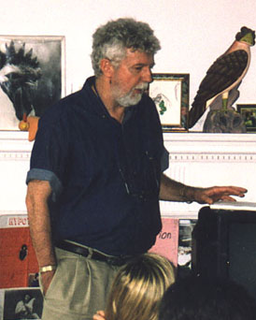A Quote by Jake M. Johnson
I view cats as more like wild animals. We feed it, but a lot of times it's not eating the food because it's murdering other animals outside and eating their meat.
Related Quotes
Some meat eaters defend meat eating by pointing out that it is natural: in the wild, animals eat one another. The animals that end up on our breakfast, lunch, and dinner plates, however, aren't those who normally eat other animals. The animals we exploit for food are not the lions and tigers and bears of the world. For the most part, we eat the gentle vegan animals. However, on today's farms, we actually force them to become meat eaters by making them eat feed containing the rendered remains of other animals, which they would never eat in the wild.
If you like eating meat but want to eat ethically, this is the book for you. From the hard-headed, clear-eyed, and sympathetic perspective of butchers who care deeply about the animals whose parts they sell, the customers who buy their meats, and the pleasures of eating, this book has much to teach. It’s an instant classic, making it clear why meat is part of the food revolution. I see it as the new Bible of meat aficionados and worth reading by all food lovers, meat-eating and not.
It has been well said that the food one consumes determines one's thoughts. By eating the flesh of various animals, the qualities of these animals are imbibed. How sinful is it to feed on animals, which are sustained by the same five elements as human beings! This leads to demonic tendencies, besides committing the sin of inflicting cruelty on animals.
While self-interest arising from the enjoyment of meat eating is obviously one reason for its entrenchment, and inertia another, a process of language usage engulfs discussions about meat by constructing the discourse in such a way that these issues need never be addressed. Language distances us from the reality of meat eating, thus reinforcing the symbolic meaning of meat eating, a symbolic meaning that is intrinsically patriarchal and male-oriented. Meat becomes a symbol for what is not seen but is always there--patriarchal control of animals and of language.
To avoid causing terror to living beings, let the disciple refrain from eating meat... the food of the wise is that which is consumed by the sadhus [holymen]; it does not consist of meat... There may be some foolish people in the future who will say that I permitted meat-eating and that I partook of meat myself, but... meat-eating I have not permitted to anyone, I do not permit, I will not permit meat-eating in any form, in any manner and in any place; it is unconditionally prohibited for all.
Animals raised on corn produce fattier meat, but it's not just that it's fattier, it's the kinds of fats. Corn-fed beef produces lots of saturated fats. So that the heart disease we associate with eating meat is really a problem with corn-fed meat. If you eat grass-fed beef, it has much more of the nutritional profile of the wild meat.
There is no meaningful distinction between eating flesh and eating dairy or other animal products. Animals exploited in the dairy industry live longer than those used for meat, but they are treated worse during their lives, and they end up in the same slaughterhouse after which we consume their flesh anyway. There is probably more suffering in a glass of milk or an ice cream cone than there is in a steak.
We live in a culture that has institutionalized the oppression of animals on at least two levels: in formal structures such as slaughterhouses, meat markets, zoos, laboratories, and circuses, and through our language. That we refer to meat eating rather than to corpse eating is a central example of how our language transmits the dominant culture's approval of this activity.
































